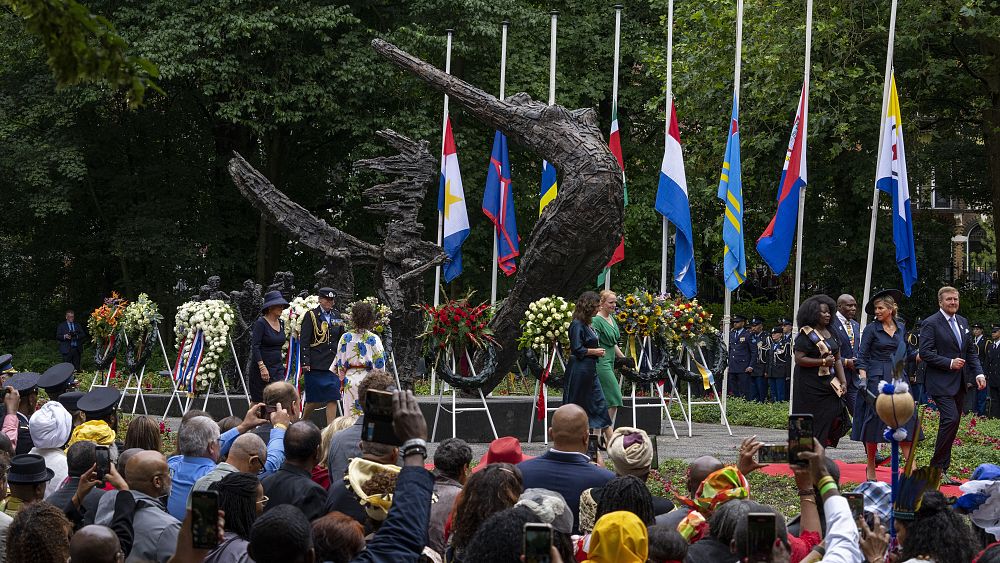
Dutch King Willem-Alexander apologised on Saturday for his country’s role in slavery and asked for forgiveness in a historic speech
In an emotional speech, Willem-Alexander referred back to that apology as he told a crowd of invited guests and onlookers: “Today I stand before you. Today, as your King and as a member of the government, I make this apology myself. And I feel the weight of the words in my heart and my soul.”
The king said he has commissioned a study into the exact role of the royal House of Orange-Nassau in slavery in the Netherlands.
“But today, on this day of remembrance, I ask forgiveness for the clear failure to act in the face of this crime against humanity,” he added.
Willem-Alexander’s voice appeared to break with emotion as he completed his speech before laying a wreath at the country’s national slavery monument in an Amsterdam park.
Some people want action to back up the words.
“Honestly, I feel good, but I am still looking forward to something more than just apologies. Reparations, for example,” said 28-years-old Doelja Refos.
“I don’t feel like we’re done. We’re definitely not there yet,” Refos added.
Former lawmaker John Leerdam told Dutch broadcaster NOS that he felt tears running down his cheeks as the king apologised. “It’s a historic moment and we have to realize that,” he said.
Slavery was abolished in Suriname and the Dutch colonies in the Caribbean on July 1, 1863, but most of the enslaved labourers were forced to continue working on plantations for a further 10 years. Saturday’s commemoration and speech mark the start of a year of events to mark the 150th anniversary of July 1, 1873.
Research published last month showed that the king’s ancestors earned the modern-day equivalent of 545 million euros from slavery, including profits from shares that were effectively given to them as gifts.
When Rutte apologised in December, he stopped short of offering compensation to descendants of enslaved people.
Instead, the government is establishing a 200 million-euro fund for initiatives that tackle the legacy of slavery in the Netherlands and its former colonies and to improve education about the issue.
That isn’t enough for some in the Netherlands. Two groups, Black Manifesto and The Black Archives, organised a protest march before the king’s speech Saturday under the banner “No healing without reparations.”
“A lot of people including myself, my group, The Black Archives, and the Black Manifesto say that (an) apology is not enough. An apology should be tied to a form of repair and reparatory justice or reparations,” said Black Archives director Mitchell Esajas.
Marchers wore colourful traditional clothing in a Surinamese celebration of the abolition of slavery. Enslaved people were banned from wearing shoes and colorful clothes, organizers said.
“Just as we remember our forefathers on this day, we also feel free, we can wear what we want, and we can show the rest of the world that we are free,” said Regina Benescia-van Windt.
The Netherlands’ often brutal colonial history has come under renewed and critical scrutiny in the aftermath of the killing of George Floyd, a Black man, in the U.S. city of Minneapolis on May 25, 2020, and the Black Lives Matter movement.
A ground-breaking 2021 exhibition at the national museum of art and history took an unflinching look slavery in Dutch colonies. In the same year, a report described the Dutch involvement in slavery as a crime against humanity and linked it to what the report described as ongoing institutional racism in the Netherlands.
The Dutch first became involved in the trans-Atlantic slave trade in the late 1500s and became a major trader in the mid-1600s. Eventually, the Dutch West India Company became the largest trans-Atlantic slave trader, according to Karwan Fatah-Black, an expert in Dutch colonial history and an assistant professor at Leiden University.
THE ROTTEN FISH: CAN OF WORMS OPENED OF APC & TINUBU'S GOVERNMENT OVER NIGERIA'S ECONOMIC DOWNTURN
WATCH THE CRITICAL ANALYSIS AND KNOW THE RESPONSIBLE PARTIES TO BLAME FOR NIGERIA'S ECONOMIC CHALLENGES, WHILE CITIZENS ENDURE SEVERE HARDSHIPS.Watch this episode of ISSUES IN THE NEWS on 9News Nigeria featuring Peter Obi's Special Adviser, Dr Katch Ononuju, 9News Nigeria Publisher, Obinna Ejianya and Tinubu Support Group Leader, McHezekiah Eherechi
The economic crisis and hardship in Nigeria are parts of the discussion.
Watch, leave your comments, and share to create more awareness on this issue.
#9NewsNigeria #Nigeria #issuesInTheNews #politics #tinubu THE ROTTEN FISH: CAN OF WORMS OPENED ...
DON'T FORGET TO SUBSCRIBE AND LEAVE YOUR COMMENTS FOR SUBSEQUENT UPDATES
#9newsnigeria #economia #economy #nigeria #government @9newsng
www.9newsng.com
